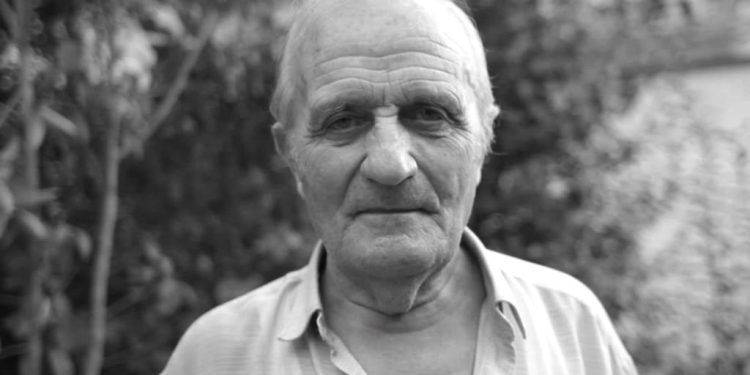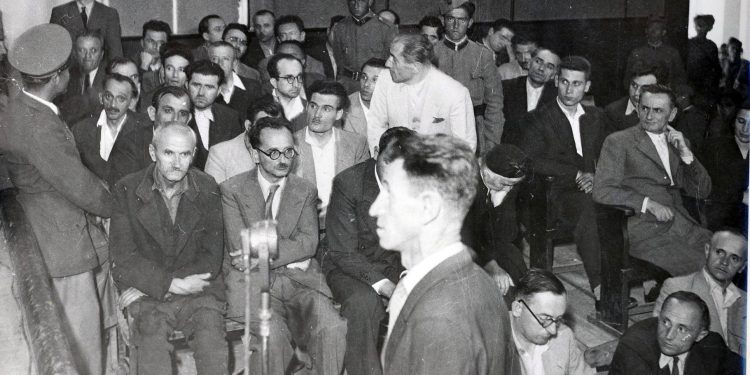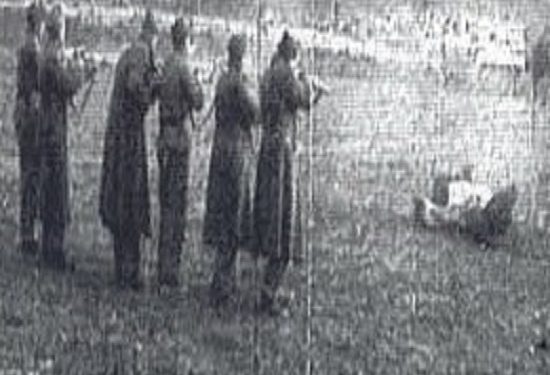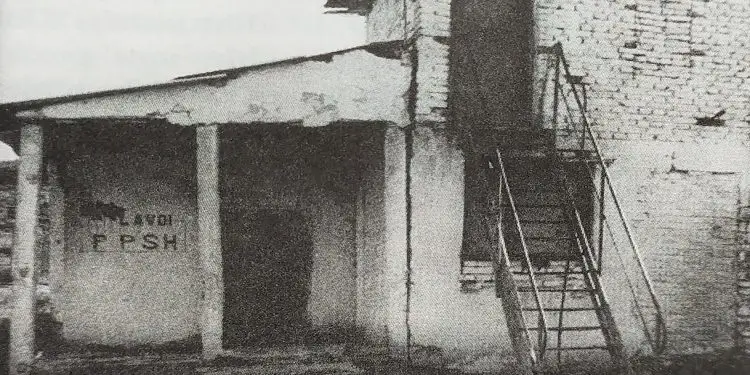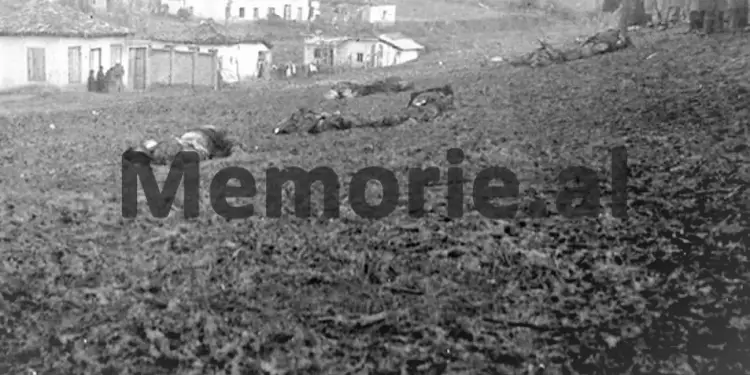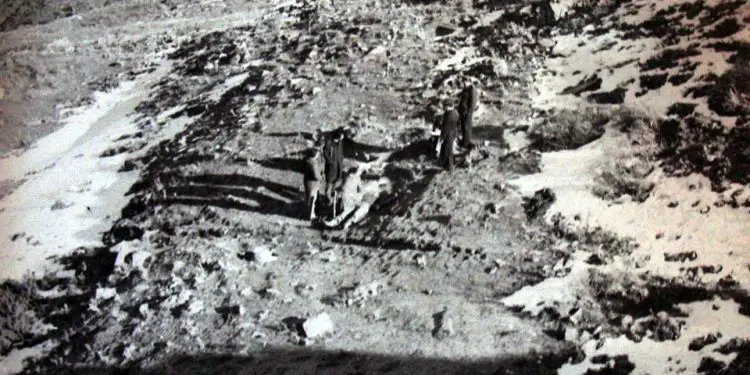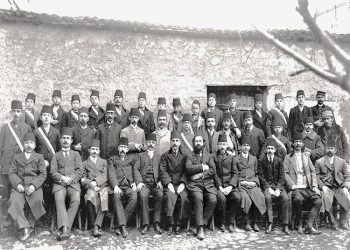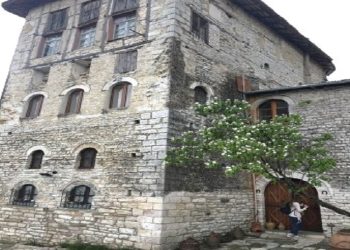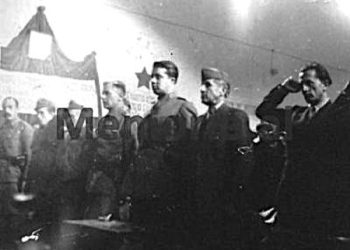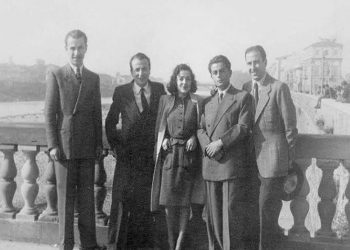By Islam Spahija
Part Six
Memorie.al / The Bjeshkët e Luma Mountains are not only known for their natural beauty and grandeur, they also have monumental value. If we talk about natural beauty, we will inevitably use Naimi’s lyrical language, we will mention “tall oaks”, “pure rivers”, “the place where cold water springs, where the flower grows with great gusto”, etc…! While if we talk about monumental value, we would refer to the folk epic where the events that occurred in specific places and points are sung, and where our national history is magnificently carved. All great people have had this privilege from nature. And for such a figure, it is worth talking.
Continued from the previous issue
PAST REFLECTIONS
The past has always been a topic used by thinkers: however, we think that it has never been so disturbing and so denied as it is in our days and in our country. Having this bitter truth in mind and its consequences, we come to the conclusion that the more ignorant and insensitive a person is, the more indifferent and denying he is towards the past.
It is precisely the dark forces that are trying to annihilate the moral values that brought about civilization. How futile! What is the past? – “You yourself”! – said a wise man. From this we understand how tragicomic it is to hide behind the denial of oneself. A lot can be said on this issue, but here we want nothing more than to respond to the political speculators who have proclaimed the cynical slogan; “We will no longer deal with the past”!
There are many who are afraid of the past, but who are they?! We, the convicts of the most barbaric dictatorship that history has known, know very well who they are. There are several categories of people, but among them we will mention: the first are the members of the “red clan”, who have dipped their hands up to their elbows in innocent blood; this includes the monist rulers and the entire apparatus of the dictatorship. The second are the privileged of the communist system, who do not care to look back, because that side represents an accusation of their servility. This includes all those who, out of fear or interest, agreed with the dictatorial regime. The third are those who, due to their social position, became the object of the infamous class war and out of helplessness, were broken. By the word “broken”, we mean submission and becoming a tool of the dictatorship, becoming servile and spies.
Unfortunately, these are part of our ranks. Then come the apathetic (insensitive) to suffering: here enter those who have been convicted for beliefs they did not have, those who have been convicted in vain. These neither had nor have any ideological concept. These also, unfortunately, are part of our ranks. All of these unite their voices, with a single chorus; denying the past, what seems strange is that some are in power, and the rest in opposition, or wander around the world with the model of dissident. They are those about whom Rexhep Qosja said, very rightly: “The Bolsheviks went dark and democrats woke up”.
If we really want to build the new life, which today it has become customary to call with love; “Democracy”, we must be wise, wise and just. And if we want to learn lessons from history, let us go to the cemetery from time to time, in that eternal world. Through eternal silence, we will hear the voice of experience. Thus we will know how to go back into the past, to see the present from afar. Only then will our gaze encompass the whole picture as a whole and then, approaching our time, we will understand it in all its details and better than those who have never abandoned it. And we will move forward, having known the traces on which the half-century ordeal of the Albanian people passed and after knowing those paths along which our society, may have neither the opportunity nor the right, to pass again. This country no longer needs careerists, but Cincinnati. And above all: let us never forget!
ON GENOCIDE
In our country, much has been said and is being said about a previously unnamed social phenomenon, “genocide”, and this to the point of the most grotesque abuse: The causes of this scythia are speculative politicians. If ordinary people use this word with or without reason, without knowing its meaning, what can we say when this ignorance suits an intellectual contrary to his conviction? This is the reason that forces us to discuss this issue, putting it in the light of truth. In this way, we think that we will block the path of an inspiring lie and will not allow the sublime suffering of a people martyred, like no other, by the Red Inquisition to be profane.
In our country, genocide was officially denounced for the first time in 1996, by a presidential decree, on the occasion of the electoral elections for the People’s Assembly. This event caused many illusions among the naive and with great fanfare the word was spread that In the end, political criminals would be punished, not “for coffee”, but for the crimes they had committed against their people. However, the content and implementation of that decree, having as its goal narrow political, i.e. speculative, interests, would certainly not affect those who had innocent blood on their hands.
The objective was elsewhere: Some leaders of the former monist government, due to the “genocide” that it had carried out, should not have had the right to be elected as deputies in the People’s Assembly. To the protests of the opposition socialists in parliament, the then Head of State responded by waving the decision letter, with the words: “This decree does not actually punish anyone”! So the purpose of that farce is clear…! However, the fact that after that decree, a wave of protests and denunciations arose from all over the country, against the communist genocide, is also true. Thus, under this pressure, the DP government put the entire leading elite of the ALP on the docket of the accused.
A little later. the death sentences of these trials were pardoned. After the elections of June 29, 1997, the socialists who came to power, being more advanced than the first in this regard, released them altogether criminals; they even solemnly declared that; “There was no “genocide” in Albania”. In order to give a more accurate answer to this cynical nihilism, our study here will focus on two main issues:
What is genocide?
Did “genocide” exist in Albania?
What is genocide?
According to the Great French Encyclopedia, this term was invented by the American professor, of Polish origin, R. Lemkin, who did not take into account the elementary rules of etymology. The Greco-Latin expression (from the Greek “genos” = race and the Latin caedere = to slay) is given to entire human groups, with the same meaning as the word “murder” has for individual individuals. As old as humanity itself, which has often assisted, without much reaction, in the massacres of populations, this crime was nevertheless not called such until the day after the Second World War, during which it was committed by the Nazi “gangster” state, on an incomparable scale.
The systematic extermination of Jews, Gypsies and other “races” considered “inferior”, whether or not their members were descended from the Third Reich, has forced humanity to no longer leave the treatment of human beings under its power to the exclusive competence of the state. Thus, from the tripartite agreement of the Allies after the war, the Statute of August 8, 1945 was drafted, according to which the international military tribunal of Nuremberg was organized, to try the greatest Nazi criminals: for crimes against humanity. Genocide, if not the only one, remains the most serious of crimes.
For this reason, the United Nations General Assembly, on December 9, 1948, approved the Convention on the Prevention and Punishment of the Crime of Genocide. Although many problems arising from this still remain unresolved, due to contradictions, there have been results. However, new progress must be made until humanity is freed from this hateful scourge. To better analyze the problem we have analyzed, let us first refer to dictionaries: According to the only dictionary that the Albanian language has today, genocide means: “The complete or partial extermination of a population or of specific national groups, carried out by imperialists and chauvinists, for criminal purposes”.
In the first part of the phrase, we are dealing with a more or less scientific definition, while in the second, with an interpretation according to communist ideology (without value). The encyclopedic dictionary ‘Larousse’ gives this explanation: “Genocide = Systematic extermination of a human group, national, ethnic or religious”. In some German dictionaries, only the German synonym of the term is found: “Volker-morder” with the explanation: “Annihilation or serious harm to a people, or to a large social group”. Of course, we will not forget any English dictionary, such as: A.S. Horby. Oxford University: Genocide = Extermination of a race by means of murderous measures, or by means of conditions that make survival impossible.
Looking at the aforementioned dictionaries, we come to the conclusion that, even if we looked at all the others, we would find definitions of a meaning that the term “Genocide” has, which is: The extermination of human groups, whatever they may be. However, international law on the punishment of genocide only takes into account national, ethnic, racial and religious groups, excluding political, economic and cultural groups (art. 2 of the 1948 Convention).
The lack of reference to political and cultural genocide is worrying, especially when we know that the international guarantee of the survival of these groups depends entirely on the existence of international protection mechanisms, and the survival of these groups depends entirely on the existence of international protection mechanisms for human rights. Finally, the achievements in this area are not convincing, despite the European Convention of 4 November 1950, which only operates within a limited framework of Western Europe.
Acts of genocide always lead to the physical and biological annihilation of the group, which constitutes the essence of this crime, whatever the means used to achieve the goal. Killing a greater or lesser number of members, serious violation of physical or mental integrity, intentional subjection of the group with sensitive conditions of existence, to the exercise of its total or partial physical destruction, measures aimed at preventing births, transfers of children to another group, etc. (art.2).
These acts can never be committed by any particular individual: By its nature, genocide can only be a collective crime, committed by the rulers of a state, in their name or with their approval, express or tacit. After the entry into force of the 1948 Convention, January 12, 1951, the constituent acts of this crime have been pointed out, both by the press and by some governments: For example; for the former Union of Soviet Socialist Republics, against some minority populations, such as the Chechens – the Ngush, the Crimean Tatars and the Volga Germans; in Nigeria against the Igbo people; in the Middle East, against the Jews of Israel and those of Arab countries; in Brazil against the Indians of the Amazon, etc.! However, the crime of genocide has never been legally established, because its punishment encounters both legal and political obstacles, which constitute the insufficient organization of international criminal justice.
To date, of the over 140 states and state entities that make up the international community, only 74 have ratified the 1948 Convention. And it is noteworthy that among the great powers that have a multiple weight in UN decisions, both the USA and Great Britain, not to mention communist China, do not appear on the list of contracting states. Humanity has not yet been freed from the scepter of genocide. Now comes the question: Did “genocide” exist in Albania? Memorie.al




